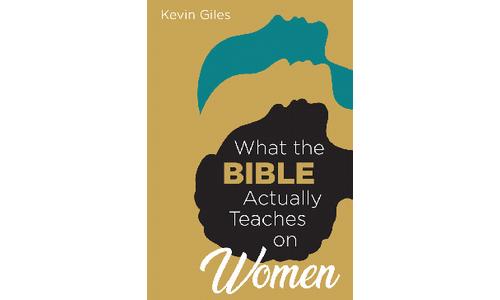Kevin Giles Responds to Dr Lionel Windsor.
Kevin Giles first reply to Lionel Windsor.
I am delighted that a Moore College lecturer, Dr Lionel J. Windsor, is critically reading my last book, What the Bible Actually Teaches About Women (Or: Cascade, 2018). I always write to encourage open debate and discussion. In addition, I am very appreciative of the fact that Lionel wrote to me first to express his concerns and criticisms, mainly on my translation of Genesis 1:27, and in his blog I am now answering he has recorded my response (see http://acl.asn.au/category/authentic/theology/). In his initial email to me personally I read him to be virtually accusing me of deliberately falsifying the evidence and deliberately rendering Gen 1:27 to say what I wanted it to say. He seemed to be saying, if I deliberately cheated on this verse nothing I said in my book of 260 pages should be uncritically assumed to be true. In reply, I admitted I had made a bad mistake in giving the pronoun in the second line of verse 27 in the plural following the English NRSV translation that gives the plural “them” when the Hebrew has the singular pronoun. I assured him it was a careless mistake with no intent to be dishonest; the several scholars that read the chapter did not note this mistake; I would write immediately to the publisher and ask that this mistake to be corrected (and I sent him my email to W&S); my mistake was inconsequential – I built absolutely nothing on the number of the pronoun; and in v 26 the pronoun is in the plural and in v 28 the verbs following Adam are in the plural.
In my personal opinion, I think Lionel makes a mountain out of a molehill over this careless mistake. In most scholarly theological books I read I note one or two mistakes. What is to be highlighted is that Lionel and I agree perfectly on the interpretation of Gen 1:27. Lionel says this verse “teaches that humanity is male and female, God created one species, humankind, in two sexes …â€. And that,
this verse is very significant (and often noted), because it implies a fundamental equality between male and female. This equality is shown by the change to the plural, and the mention of “male and female†together (note also the plurality in verses 26 and 28). This equality as male and female in the image of God is supremely important for our understanding of men and women. Equality matters deeply. There is broad agreement here: nobody I’m aware of disputes this.
I could not say it better. Adam is male and female and this verse teaches that the first man and woman are not just “spiritually equalâ€; they are “fundamentally equalâ€. If this is what Gen 1:27 is teaching I find it hard to believe that Genesis chapter 2 would contradict this bold assertion of the fundamental equality of the sexes, given on the first page of our Bibles by then teaching that in God’s good creation, before the fall, woman is permanently subordinated to man as God’s ideal; he is to rule, she is to obey, what complementarians consistently teach.
I stand by my charge that the Köstenberger’s argument that in Gen 1:27 Adam is first of all man (male) is “not serious scholarship.†Lionel quite fairly thinks I should have given more attention to the singular “him†in verse 27 that the Köstenberger’s think clearly speaks of male headship before the fall. In the light of the plural in verse 26 and 28 I did not think this argument had any force. I saw it as special pleading. I concentrated rather on making the point that verse 27 in the context of verses 1:26-28 boldly assert that man and woman are one in dignity, status and rule. They are “fundamentally equalâ€. Gen 1:26-28 excludes any thought that the man (male) has some precedence. In my interpretation of Genesis 1:27-28, that Lionel agrees with, I follow most contemporary biblical scholars, Catholic and Protestant. There is nothing exotic in this interpretation of these verses.
I note that Lionel says he has “a few questions†about whether or not the Köstenberger’s contrary interpretation of verse 27 can be “justified.†Nevertheless, in his somewhat convoluted blog Lionel argues that “possibly†the Köstenberger’s are right to find in verse 27 precedence given to man, the male. He thinks their case is “serious scholarship†because it foreshadows the hierarchical ordering of the man over the woman spelled out in Genesis chapter 2. I take it Lionel has so focused on my bad mistake in quoting the English translation of Gen 1:27 that he misses the point that my primary argument in my book in my chapter on Genesis 1-3 is that Genesis chapter 2 does not subordinate man to woman before the fall. The Bible makes the rule of the man over the woman entirely and explicitly a consequence of the fall (Gen 3:16). This is the majority conclusion of contemporary Protestant exegetes; the official teaching of the Catholic Church, and what Jesus implies is what we should believe (See my What the Bible Teaches, pp. 81-82). I am looking forward to Lionel’s response to the argument, with widespread scholarly support, that the Bible itself makes the rule of the man over the woman entirely a consequence of the fall; something sinful. If it is conceded it means the complete defeat of complementarian theology.
I am delighted to hear that Lionel believes that in this debate about what the Bible teaches on women “we need to clarify the use of words.†On this we are also in total agreement. In my many writings on what the Bible teaches on the sexes over the last 40 years I must have made this plea a hundred times. I have pointed out that all the key terms complementarians love to use obfuscate rather than clarify the issues in contention. For example, the words “roleâ€, “differenceâ€, “equalâ€, “order†and “complementarian†mean one thing to complementarians and for other Christians, with a dictionary in hand, something else. They are code words. In good theology, sound theology, evangelical theology, words should be used to help clarify the issue(s) in dispute, not conceal. In regard to Lionel’s key term in his blog, “orderâ€, I ask him to define this word. In the dictionary (Macquarie Concise) on my desk 39 meanings of this word are given. I suspect Lionel takes the word to mean hierarchy, one person or sex is permanently ordered above or below the other. If this is so, then for him to speak of hierarchical ordered and equal relationships is as meaningless as speaking of a round square. Permanently fixed hierarchical ordering create social superiors and inferiors.
For me, the word “equalâ€, used to speak of social relationships, is an ideal. All people are not equal; some are stronger, healthier, richer, better educated, more powerful and so on, than others Those who work to see a better, fairer and kinder world; to see heaven on earth, want people to be more equal. This is their goal. They long to see people valued equally and given equality of opportunity, especially in education. In the church, Christians with this goal in mind want the gifts of ministry God gives to men and women, including the gift of leadership, recognised, affirmed and used They believe that the Spirit is given in like measure to men and women and on this basis men and women can have the same gifts of the Spirit; neither man or women is privileged in the new creation. Do not Jesus, Luke and Paul affirm or imply this truth? I suspect Lionel thinks the word “equal†speaks of spiritual or soteriological equality that has no social or practical application in the new creation. Men, as far as leadership in the world, the church and the home are concerned, are “more equal.†Do note, that this social use of the word “equal†implies difference. Two things that are identical are said to be “the same.†Complementarians and egalitarian evangelicals with one voice affirm male-female differentiation. Where we disagree is that egalitarians evangelicals predicate indelible male-female differentiation on our differing bodies and chromosomes given in birth. Complementarians base male-female differentiation on differing “rolesâ€, which seems to me a precarious. Cannot roles change?
I am really looking forward to an ongoing dialogue with Lionel as he reads on in my book. I certainly have a sharp and thoughtful critic. It would be a shame if he does not continue to critically disclose his thinking and evaluation of my book as he continues his reading past the first chapter on what the Bible actually teaches on women. Sydney Anglicans have been waiting for 20 years for an up-to-date debate on what the Bible says on the status and ministry of women. The problem for complementarians is that it can no longer be honestly argued that God has given leadership exclusively to men; “Leadership is Maleâ€, as one book giving the complementarian case is entitled. Just as we now all recognise that the world is not flat, we all recognise that women make excellent leaders in all spheres of life. I for one cannot think the Bible denies what is so obviously true. Perhaps you, the reader of Lionel’s blog and my reply, ought to buy and read my book. There is nothing like reading a primary source. It is best to order this or any other of my books on line because buyers find Koorong generally do not hold stocks of my writings for some reason.
I sent my reply to Lionel to critically read before posting it and he only asked for one correction which I made, but on two other points he said his thinking was a bit more complex than I suggested. I am sure it is.
Kevin Giles
Melbourne






